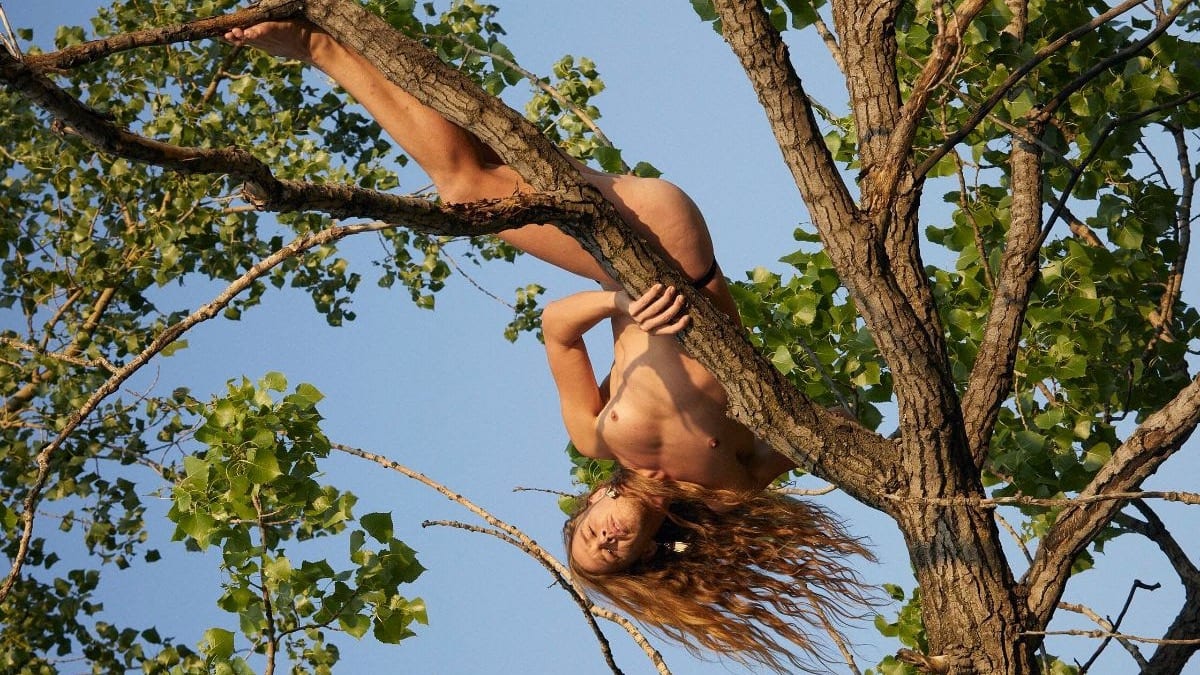Listening to Kìzis’ Tidibàbide / Turn feels like arriving at a party in full swing. An intimate chorus of overlapping voices and joyful laughter filter throughout its fluid collision of musical styles spanning nearly four hours over 36 songs. Orchestral pop, thumping techno and solemn spoken-word passages are driven by the pulse of the heartbeat drum, drawing on the sacred traditions of powwow dances from Kìzis’ childhood. The Montreal-based Algonquin Two-Spirit artist is joined by over 50 collaborators including Owen Pallett, Beverly Glenn-Copeland and Cub Sport’s Tim Nelson for a love-rave stretching long into the night.
“I made this music because I love to create and sing with my native language, first and foremost, as well as English,” Kìzis says. “I take the teachings of my Indigenous family in all different sizes and skin tones to heart. We deserve every opportunity to enjoy the sun on our faces when we’re not underground and let nature do what it does best.”
“I made this music because I love to create and sing with my native language, first and foremost.”
Growing up in the countryside of Southern Ontario, Kìzis found solace in music at a young age as “a place where I could express myself and find my voice.” The song “Run,” from the new album, dates back to those formative memories of racing alongside her family’s pair of German Shepherds and belting out a simple mantra: “It feels so good to run!” Transposing the melodies in her head onto piano led to a self-taught education in guitar, violin and cello, providing a method to connect with fellow students at her high school. “I had my way into the social milieu despite the conditions set against me as a little faggot,” Kìzis laughs.
Sadly, she has many painful memories from these years. Without going into detail, Kìzis shares that she suffered abuse from “outside sources coming into the family home,” as well as a period spent as a sex worker from ages 16 to 18. Yet she refuses to allow these experiences to define her. After moving to Montreal, Kìzis formed the band Archery Guild, sowing the seeds for future efforts in collectivity with the group’s album DIN, which features over 40 musicians. “You get what you aim for,” she jokes. “We released an album called DIN and that’s exactly what it sounded like.”
Kìzis began focusing on solo work in her early 20s, first earning the support of Montreal DIY label Egg Paper Factory and then Tin Angel Records from the U.K. Traveling to Europe gave her the opportunity to meet several of the musicians who appear on Tidibàbide / Turn, such as contrabassist Joseph Carvell and violinist Jordan Hunt, adding to the album’s densely layered symphonic/electronic patchwork. Compiling recording sessions in London, Berlin, Lima, Montreal and Moosonee, Ontario, these maximalist techniques resulted in mid-album standout “The Exquisite Party Girl,” containing nearly 1,000 vocal or instrumental tracks.
Though it may sound overwhelming on paper, Tidibàbide / Turn rewards with repeat listens as its many interlocking elements emerge. Owen Pallett’s string arrangements on “Tebewewin (Ancestral Mother)” give the song a stirring grandeur, while the dancefloor-ready synths of “Amanda” swirl around a repeated affirmation to escape your troubled past: “A child… that you don’t have to be anymore.” Beverly Glenn-Copeland and Elle Barbara both appear on the four-part “Sister Flower” suite, where sharp ears can pick out a brief snippet of Bill Withers’ “Lovely Day.” Kìzis twists the national anthem into a mournful lament on “No Canada” and vibes out for nine minutes on the brass-boosted highlight “Kiss the Valley.”
“It just takes all the time it needs to take,” Kìzis says. “I disregard how long a song needs to be while giving the production a lot of consideration and space.” This can result in arrangements that are bursting at the seams, yet she believes small details are integral. “Each song is supposed to be an immersive moment that people can dance to or sit with,” she says. Her obsessive process also results in a singular sound not solely referencing any genre or artist. “When I was making this album I wasn’t listening to anything else,” Kìzis admits. “I was actively creating.”
Cherokee, Muscogee and Japanese composer Elisa Harkins is yet another acclaimed artist whose name pops up on Tidibàbide / Turn. Her latest album Radio III / ᎦᏬᏂᏍᎩ ᏦᎢ is described as “combining disco and Indigenous languages in an effort to alter the fate of these endangered languages through active use.” Kìzis has a similar motivation behind welcoming this many guests onto her recordings. A communal celebration of the past and acknowledgement of changes needed in the present are key to cultivating the beautiful future that her art evokes.
“There are strong Natives in this city owning the streets with sleeping bags,” Kìzis says. “Everyone I pass is like seeing each others’ history. We often smile or nod a ‘heya.’ We know our stories before we decide to share. At the end of the day, most of us are asking to not be alone. Some are angry and I know that anger. At times I compose through this with my songs.
“[This album] couldn’t be what it is if I hadn’t stopped to spend time with my kin,” she continues. “Every word they say is more than anyone else could offer, even though I will never use those words in my music, because those moments belong to us.
“I know there is still not enough representation of Indigenous music today because the greatest ones may never be heard. This is why I have worked so hard to build a full landscape, where you can be with this. And love it.”
Correction: February 9, 2021 3:59 pmThe duration of Kìzis’ album Tidibàbide / Turn has been updated. Incorrect information appeared in an earlier version of this story.


 Why you can trust Xtra
Why you can trust Xtra


